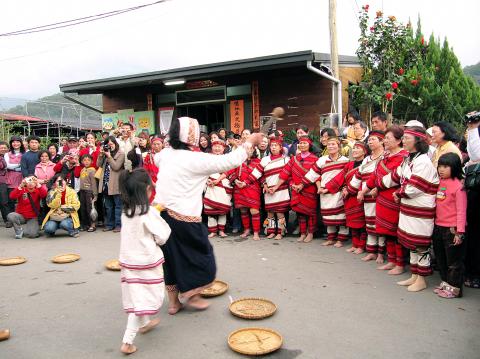The Kahabu people (also written as Kaxabu), one of the Pingpu Aboriginal tribes, will hold a festival in the Niumin (牛眠) community, on the outskirt of Puli Township (埔里), Nantou County, on Dec. 8. It will be an excellent opportunity for anyone interested in this group of Pingpu Aboriginals to learn something about their culture and traditional rituals.
“This event celebrates the New Year, according to our traditional lunar calendar,” said Aylian Hsiao (蕭愛蓮), secretary-general of the Kaxabu Culture and Education Association of Nantou County (南投縣噶哈巫文教協會), the festival’s main organizer.
“It is the most important festival for our Kahabu community. Family members return home to attend because it is full of joyful celebrations — with dance, music, entertainment and communal meals,” she told the Taipei Times.

Photo: Jason Pan, Taipei Times
Pingpu, or plains, refers to various Aboriginal groups living in lowland areas around the country that have adopted Han Chinese culture to different degrees, with many having lost their culture, language and ethnic identity.
Although they are also Aborigines, many Pingpu groups such as the Kahabu are not officially recognized as such because they didn’t register their ethnic identity in the 1950s.
“The festival is held so that we will not forget our history and our culture,” Hsiao said.
Hsiao said visitors are welcomed to join in, with events running from 10am to 9pm. In the morning, there will be guided tours of the community and the Kahabu Cultural Museum. The tours will also introduce the area’s newly-initiated agritourism projects.
The main events are in the afternoon, with traditional competitions of a short-marathon running race (走鏢), bow-and-arrow shooting and dexterity skill of splitting sugar cane with a traditional hunting knife.
The highlight is the traditional dance and music performance by Kahabu groups. Hsiao said this year’s roster of events include performances by other Pingpu groups: Pazeh, Tavorlong and Siraya.
The festival will culminate with a Kahavu Bonfire, where people will join hands and sing songs while walking around a large fire. The festival wraps up in the evening with a celebratory dinner with Kahabu community families.
“Everyone is welcomed to participate in the bonfire, the bigger the crowd to give better prospects for next year’s agricultural harvest,” Hsiao said.
Getting there:
Kuo-Kuang (國光客運) bus service departs from the Western Bus Terminal near Taipei Main Station, direct to Puli. A shuttle bus departs the Puli bus station on the hour, every hour from 7am to 3pm to the festival site.

Google unveiled an artificial intelligence tool Wednesday that its scientists said would help unravel the mysteries of the human genome — and could one day lead to new treatments for diseases. The deep learning model AlphaGenome was hailed by outside researchers as a “breakthrough” that would let scientists study and even simulate the roots of difficult-to-treat genetic diseases. While the first complete map of the human genome in 2003 “gave us the book of life, reading it remained a challenge,” Pushmeet Kohli, vice president of research at Google DeepMind, told journalists. “We have the text,” he said, which is a sequence of

On a harsh winter afternoon last month, 2,000 protesters marched and chanted slogans such as “CCP out” and “Korea for Koreans” in Seoul’s popular Gangnam District. Participants — mostly students — wore caps printed with the Chinese characters for “exterminate communism” (滅共) and held banners reading “Heaven will destroy the Chinese Communist Party” (天滅中共). During the march, Park Jun-young, the leader of the protest organizer “Free University,” a conservative youth movement, who was on a hunger strike, collapsed after delivering a speech in sub-zero temperatures and was later hospitalized. Several protesters shaved their heads at the end of the demonstration. A

In August of 1949 American journalist Darrell Berrigan toured occupied Formosa and on Aug. 13 published “Should We Grab Formosa?” in the Saturday Evening Post. Berrigan, cataloguing the numerous horrors of corruption and looting the occupying Republic of China (ROC) was inflicting on the locals, advocated outright annexation of Taiwan by the US. He contended the islanders would welcome that. Berrigan also observed that the islanders were planning another revolt, and wrote of their “island nationalism.” The US position on Taiwan was well known there, and islanders, he said, had told him of US official statements that Taiwan had not

We have reached the point where, on any given day, it has become shocking if nothing shocking is happening in the news. This is especially true of Taiwan, which is in the crosshairs of the Chinese Communist Party (CCP), uniquely vulnerable to events happening in the US and Japan and where domestic politics has turned toxic and self-destructive. There are big forces at play far beyond our ability to control them. Feelings of helplessness are no joke and can lead to serious health issues. It should come as no surprise that a Strategic Market Research report is predicting a Compound